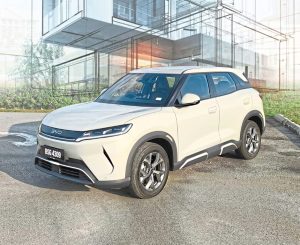Teslas and other electric cars prone to rust, German testers warn
By DPA | 18 January 2023
BERLIN: Rusty cars in everyday use on roads are getting rare these days, but tests in Germany indicate that some modern electric cars are alarmingly prone to corrosion.
Testing agency GTÜ told car magazine Auto Motor und Sport that Tesla's Model 3 electric is a prime candidate for rust, which remains remains an issue on many modern cars, notably electrics.
There have also been reports of rusty bolts on other Tesla models and rust on the disc brakes of electrics from other brands such as Toyota and Renault.
The corrosion problems have been highlighted by Germany's tough vehicle road-worthiness testing regulations, which kick in once a car is three years old. After that, the vehicle must be submitted for a test every two years.
Rust expert Ralf Roessler examined a Tesla model with only 300km on the clock for Auto Motor und Sport and he found that the frame had been treated to only a thin coat of paint. The A-pillars were also filled with a construction foam which has a tendency to absorb water like a sponge.
"It will get soaked with water. In six months it will be brown, in six years it will be rotted out," said Roessler. He said initial rust was also visible on the link bars, which are a part of the suspension. "The whole front beam rusts first because the water has nowhere to drain," said Roessler.
The findings tie in with similar reports from the US of unusually rusty bolts on some older Tesla Model S cars.
Rust has largely been banished from cars thanks to improvements in underbody protection, galvanisation and zinc coatings along with plastic wheel arch liners and cavity sealing. Volkswagen grants its vehicle customers a 12-year guarantee against rusting.
It seems that that in order to save weight because of heavy batteries, carmakers are using thinner steel. Other common materials in electric cars such as aluminium and magnesium can react chemically with each other and cause galvanic corrosion.
Germany's ADAC car club previously said it was concerned that rust damage on modern cars can remain undetected for a long time, which could have an impact on crash safety.
Overall faults found on the Renault Zoe electric runabout were average for its age but TÜV testers highlighted faulty brakes.
Electric cars make use of recuperative braking which means that the driver uses the footbrake less often. This can lead to corrosion on components at the wheels which could, in serious cases, render the brakes inoperative, said TÜV federation director Joachim Buehler.
Tags
Autos Tesla
Reviews

8.2
BYD Atto 2: Urban by nature

2026 Proton Saga: Right gear for the job

7.6
Honda Africa Twin Adventure Sports ES: Rugged refinement

Edmunds tests BMW X5 and Mercedes GLE: Which is the better P...

Chery Tiggo 7 PHEV and Tiggo 8 PHEV: Monsoonal exploit

7.2
CFMoto 450MT: A good all-rounder

8.8
Toyota Camry 2.5 HEV: Extra premium and beyond

7.2
Jetour VT9 Prime: Space comes first
Videos

BYD Atto2's rotating centre display

Free & Easy Media Test: Latest Proton X50 Flagship to Kuanta...

Zeekr Space Sunway City Video
